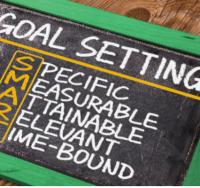Practical Resolutions for the New Year

You may have already set this year’s New Year’s resolutions, but it’s never too late to amend, add, or rethink what your aspirations for the upcoming months are. Setting resolutions is a good way to set targets and goals, but experts say the resolutions need to be realistic – attainable and achievable. The list of professional resolutions can be endless, everything from learning a new skill to growing your business. Once you start thinking about it, that list can get long and while it may be exciting to set goals, without an action plan, the items may just remain on the list. We encourage choosing 1-4 diverse goals that you can actively monitor progress over the year. We have a short list of professional goals for your consideration.
Knowledge development
Find mentors and colleagues to regularly connect with. A network of supportive professionals is very helpful to discuss legal or file related questions or issues when they arise, to keep each other updated on new rules, laws, and procedures, to bounce ideas on how to run a smoother business, and to refer your clients to another lawyer when you are unable to take on a matter. Everyone needs help and it is much easier to have a dedicated group of people that you can turn to when time is of the essence.
Mentors are key when you are expanding your area of practice and complexity of files. We discourage dabbling because “you don’t know what you don’t know” – potentially leading to an errors and omissions claim. Expanding your practice in a responsible way includes CPDs, good precedents, checklists, and mentors. The Law Society of Ontario has a Coach and Advisor Network (CAN) program that pairs you with mentors for either specific file related questions or development of specific skill or tackle practice management best practice. Various law associations also have mentorship programs and networking events. In general, we have found that the Ontario Bar is very collegial.
Find a list of some Ontario Mentoring Programs here.
Increase efficiencies through technology
Embracing innovative technology may be a daunting task, but if you pick one or two things you want to focus on for the year, with target deadlines, it may not be as scary. Below are steps to get you on your way:
a) Look at options: Explore a few technology options and narrow them down to 2 or 3 that you think fit your needs. One efficient way to start the process is to ask your colleagues, with a similar size firm as yours, what they are using and the pros and cons.
b) Decide: Book a consultation session with the companies offering the products in which you are interested. After the consultations, try to decide as soon as possible while the information is fresh.
c) Install: Purchase, install, migrate current data and attend to any other technical aspects (such as security and how data will be backed up).
d) Training: Train yourself and staff. Usually, the software company offers complimentary training, it is one of the things you should consider when deciding which option to choose, along with post purchase support.
e) Discontinue old program or method: Ensure the information using the previous program or method has been saved, stored, backed up, or transferred and stop usage of it.
practicePRO.ca has a list of Technology Products for Lawyers and Law Firms for your consideration.
Business development
Business development is an ongoing responsibility whether you are new in practice or well established. Consider the type of clients you want to attract and keep and develop an action plan – maybe you want to put an ad in a local newspaper or magazine that targets people in a geographic location that you want clientele from or a cultural newspaper that is geared for people that speak another language that you can also offer legal services in.
Consider your current referral source and how you can continue developing your work relationship with them – maybe you want to send each referral source a personalized gift on their birthday or take them out for lunch.
Mental wellness
We often set ambitious goals that sound doable in theory but not practical. It is important to commit to a work-life balance but a plan that leaves room for emergencies. For example, it may be unrealistic to set a goal that you will never work past 5pm. Most lawyers, at some point, have unexpected matters on files that arise, frantic clients, a sick colleague (lawyer or clerk) that you need to “cover for”, or an urgent request by a repeat client that may require you to work early or late or longer on any given day. Setting very firm concreate resolutions may lead to disappointment and reverting to “old habits” — versus a goal that is more fluid and practical. For example, a resolution that you will not look at your work emails and messages during dinner time or you will turn off notifications after you have left your desk may be more realistic.
MAP services, operated by Homewood Health, is available 24-7 with lots of information to support mental wellness goals.
It is important to set professional goals and deadlines that are important to you. Without them, it’s easy to get lost in the files and the busy days and before you know it, another year will come to an end. As the saying goes “the days are long, but the months are short”. Select a few goals, break it down into digestible subgoals/targets, and action earlier than later. We wish you the best this year in your practice!

Leave a Reply